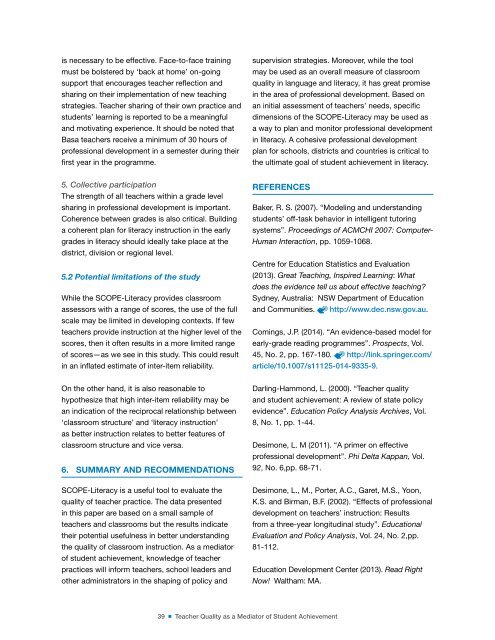UNDERSTANDING WHAT WORKS IN ORAL READING ASSESSMENTS
MZhk301yPHZ
MZhk301yPHZ
You also want an ePaper? Increase the reach of your titles
YUMPU automatically turns print PDFs into web optimized ePapers that Google loves.
is necessary to be effective. Face-to-face training<br />
must be bolstered by ‘back at home’ on-going<br />
support that encourages teacher reflection and<br />
sharing on their implementation of new teaching<br />
strategies. Teacher sharing of their own practice and<br />
students’ learning is reported to be a meaningful<br />
and motivating experience. It should be noted that<br />
Basa teachers receive a minimum of 30 hours of<br />
professional development in a semester during their<br />
first year in the programme.<br />
supervision strategies. Moreover, while the tool<br />
may be used as an overall measure of classroom<br />
quality in language and literacy, it has great promise<br />
in the area of professional development. Based on<br />
an initial assessment of teachers’ needs, specific<br />
dimensions of the SCOPE-Literacy may be used as<br />
a way to plan and monitor professional development<br />
in literacy. A cohesive professional development<br />
plan for schools, districts and countries is critical to<br />
the ultimate goal of student achievement in literacy.<br />
5. Collective participation<br />
The strength of all teachers within a grade level<br />
sharing in professional development is important.<br />
Coherence between grades is also critical. Building<br />
a coherent plan for literacy instruction in the early<br />
grades in literacy should ideally take place at the<br />
district, division or regional level.<br />
5.2 Potential limitations of the study<br />
While the SCOPE-Literacy provides classroom<br />
assessors with a range of scores, the use of the full<br />
scale may be limited in developing contexts. If few<br />
teachers provide instruction at the higher level of the<br />
scores, then it often results in a more limited range<br />
of scores—as we see in this study. This could result<br />
in an inflated estimate of inter-item reliability.<br />
REFERENCES<br />
Baker, R. S. (2007). “Modeling and understanding<br />
students’ off-task behavior in intelligent tutoring<br />
systems”. Proceedings of ACMCHI 2007: Computer-<br />
Human Interaction, pp. 1059-1068.<br />
Centre for Education Statistics and Evaluation<br />
(2013). Great Teaching, Inspired Learning: What<br />
does the evidence tell us about effective teaching?<br />
Sydney, Australia: NSW Department of Education<br />
and Communities. http://www.dec.nsw.gov.au.<br />
Comings, J.P. (2014). “An evidence-based model for<br />
early-grade reading programmes”. Prospects, Vol.<br />
45, No. 2, pp. 167-180. http://link.springer.com/<br />
article/10.1007/s11125-014-9335-9.<br />
On the other hand, it is also reasonable to<br />
hypothesize that high inter-item reliability may be<br />
an indication of the reciprocal relationship between<br />
‘classroom structure’ and ‘literacy instruction’<br />
as better instruction relates to better features of<br />
classroom structure and vice versa.<br />
6. SUMMARY AND RECOMMENDATIONS<br />
SCOPE-Literacy is a useful tool to evaluate the<br />
quality of teacher practice. The data presented<br />
in this paper are based on a small sample of<br />
teachers and classrooms but the results indicate<br />
their potential usefulness in better understanding<br />
the quality of classroom instruction. As a mediator<br />
of student achievement, knowledge of teacher<br />
practices will inform teachers, school leaders and<br />
other administrators in the shaping of policy and<br />
Darling-Hammond, L. (2000). “Teacher quality<br />
and student achievement: A review of state policy<br />
evidence”. Education Policy Analysis Archives, Vol.<br />
8, No. 1, pp. 1-44.<br />
Desimone, L. M (2011). “A primer on effective<br />
professional development”. Phi Delta Kappan, Vol.<br />
92, No. 6,pp. 68-71.<br />
Desimone, L., M., Porter, A.C., Garet, M.S., Yoon,<br />
K.S. and Birman, B.F. (2002). “Effects of professional<br />
development on teachers’ instruction: Results<br />
from a three-year longitudinal study”. Educational<br />
Evaluation and Policy Analysis, Vol. 24, No. 2,pp.<br />
81-112.<br />
Education Development Center (2013). Read Right<br />
Now! Waltham: MA.<br />
39 ■ Teacher Quality as a Mediator of Student Achievement



